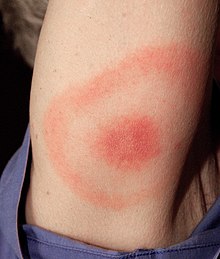|
Erythema
Erythema (Ancient Greek: ἐρύθημα, from Greek erythros 'red') is redness of the skin or mucous membranes, caused by hyperemia (increased blood flow) in superficial capillaries.[1] It occurs with any skin injury, infection, or inflammation. Examples of erythema not associated with pathology include nervous blushes.[2] TypesCausesIt can be caused by infection, massage, electrical treatment, acne medication, allergies, exercise, solar radiation (sunburn), photosensitization,[3] acute radiation syndrome, mercury toxicity, blister agents,[4] niacin administration,[5] or waxing and tweezing of the hairs—any of which can cause the affected capillaries to dilate, resulting in redness. Erythema is a common side effect of radiotherapy treatment due to patient exposure to ionizing radiation. DiagnosisErythema disappears on finger pressure (blanching), whereas purpura or bleeding in the skin and pigmentation do not. There is no temperature elevation, unless it is associated with the dilation of arteries in the deeper layer of the skin.[citation needed] See alsoReferences
External linksLook up erythema in Wiktionary, the free dictionary. Wikimedia Commons has media related to Erythemas. |
||||||||||
